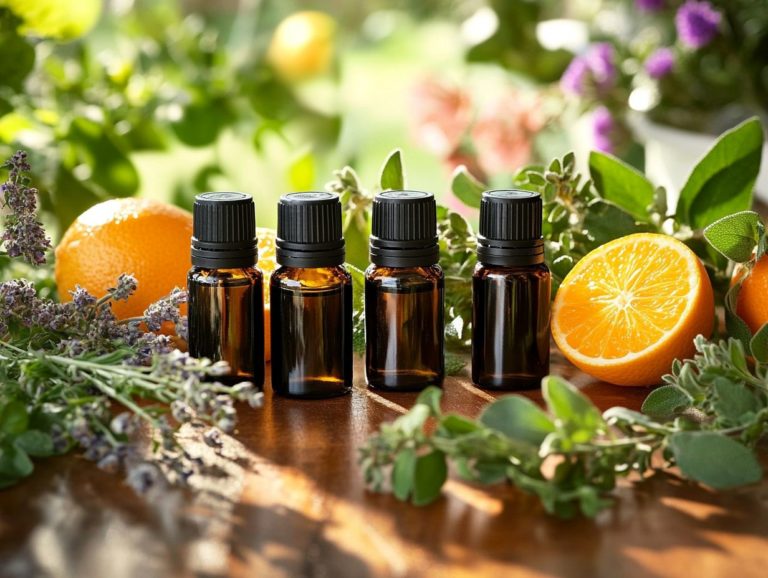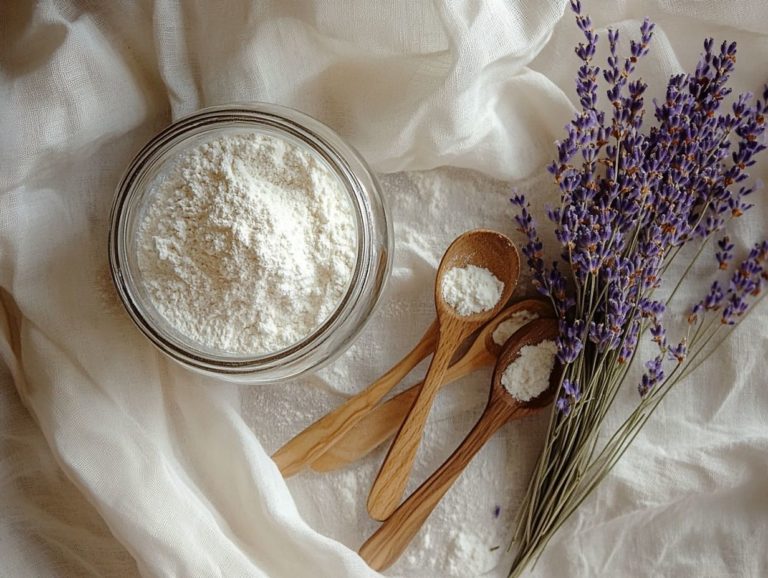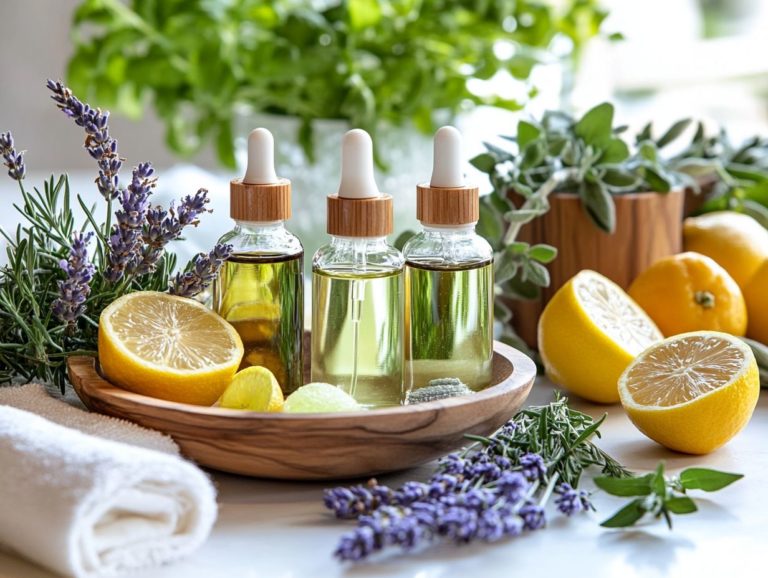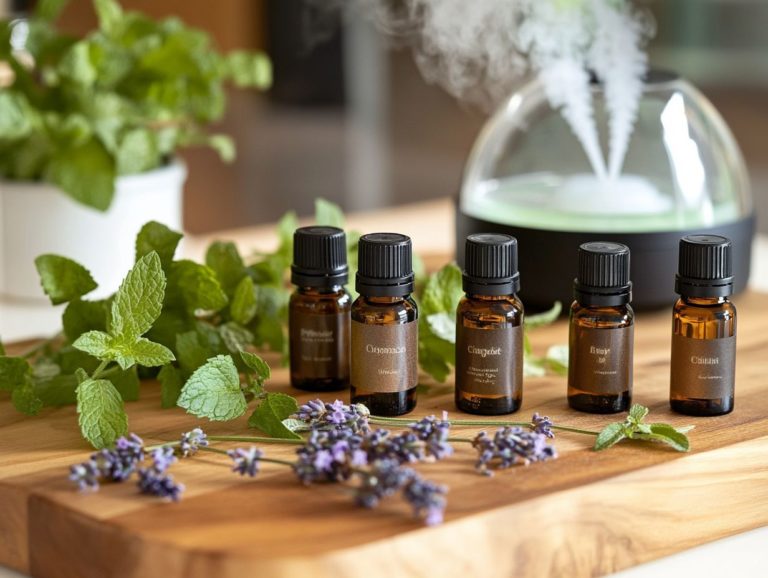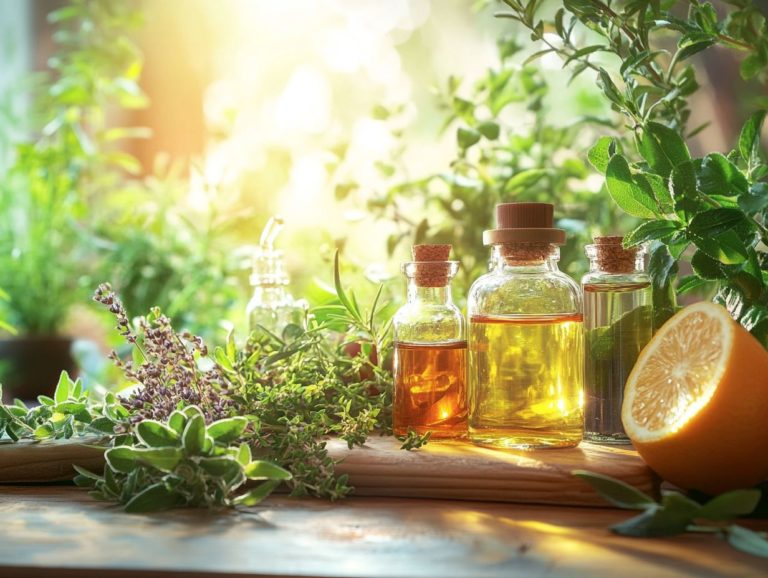Essential Oils for Cleaning: What You Need to Know
Essential oils are not merely pleasant scents to enhance your home; they have the potential to elevate your cleaning routine into a natural and highly effective practice. Brimming with antibacterial and antimicrobial properties, these pure extracts present a safer alternative to traditional cleaning products.
This article delves into the world of essential oils, explaining their function in cleaning and the numerous benefits they offer. You’ll discover which oils are the most effective for your needs, learn about any potential risks, and gain valuable tips for safe application, including laundry tips.
Get ready to unlock the incredible power of essential oils and revolutionize your cleaning routine!
Contents
- Key Takeaways:
- What Are Essential Oils?
- How Do Essential Oils Work for Cleaning?
- What Are the Benefits of Using Essential Oils for Cleaning?
- What Are the Best Essential Oils for Cleaning?
- How to Use Essential Oils for Cleaning?
- Are There Any Risks or Side Effects of Using Essential Oils for Cleaning?
- Tips for Using Essential Oils Safely for Cleaning
- Frequently Asked Questions
- 1. What are essential oils and how can they be used for cleaning?
- 2. Which essential oils are best for cleaning?
- 3. How do I use essential oils in my cleaning routine?
- 4. Are essential oils safe to use for cleaning?
- 5. Can essential oils replace traditional cleaning products?
- 6. Are there any precautions I should take when using essential oils for cleaning?
Key Takeaways:
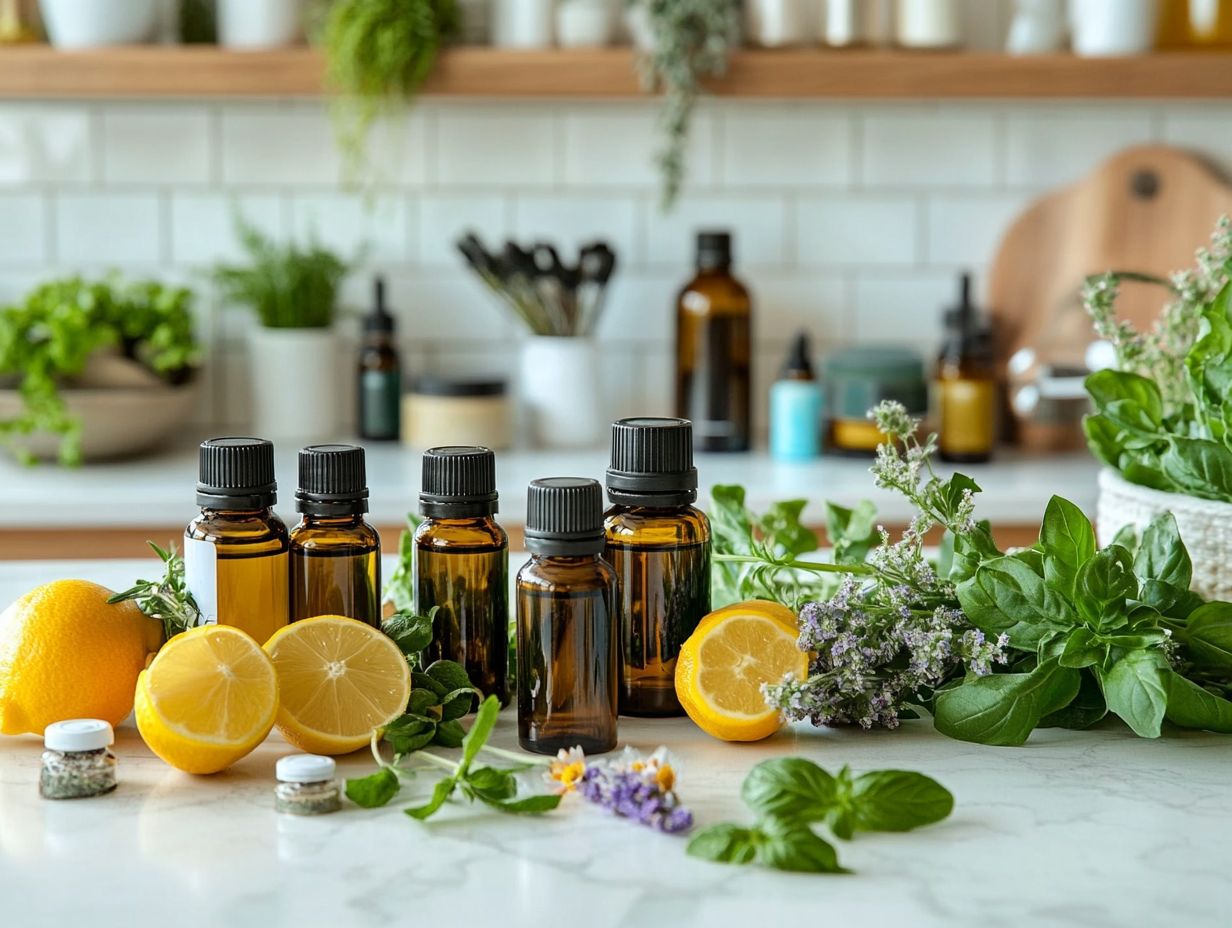
- Essential oils offer a natural and non-toxic alternative for cleaning, making it safer for both humans and the environment.
- Lemon, tea tree, peppermint, lavender, and eucalyptus essential oils are among the best options for their antibacterial and antimicrobial properties.
- Essential oils can be used in various ways for cleaning, including all-purpose sprays, disinfecting wipes, and air fresheners. However, it is important to use them safely and be aware of potential risks such as skin irritation, toxicity, and other health conditions.
What Are Essential Oils?
Essential oils are concentrated plant extracts that encapsulate the aromatic properties and beneficial compounds of various plants. These are plant extracts that have a strong scent and contain the beneficial parts of the plants, derived from different parts of plants, such as leaves, flowers, bark, roots, and seeds, embodying the true essence of their botanical origins.
Renowned for their diverse applications, essential oils find their place in everything from the practice of using scents for relaxation and health to holistic health and eco-friendly cleaning solutions. With potential properties that include antibacterial and antimicrobial effects, it s no wonder you might consider integrating essential oils into your life for a more natural and non-toxic approach to well-being. They are effective for cleaning surfaces and offer numerous health benefits.
How Do Essential Oils Work for Cleaning?
Essential oils serve as a powerful ally in your cleaning routine, leveraging their inherent properties to eliminate bacteria and other harmful microorganisms from a variety of surfaces. Potent plant extracts, like tea tree and lemon oil, refresh your space and disinfect surfaces.
By incorporating these oils into your cleaning solutions, you can create an effective and natural alternative to commercial products, all while fostering a healthier home environment.
What Are the Benefits of Using Essential Oils for Cleaning?
The advantages of using essential oils for cleaning are abundant, presenting an enticing option for those who desire natural and non-toxic alternatives to conventional cleaning products. These oils not only boast antibacterial and antimicrobial properties that effectively eliminate germs, but they also fill your spaces with delightful aromas, fostering a sense of well-being.
By integrating essential oils like lavender, eucalyptus, and peppermint into your cleaning routine, you will enjoy both a spotless home and the uplifting scents of nature!
1. Natural and Non-Toxic
One of the primary benefits of using essential oils for cleaning is that they are natural products, offering a safer alternative to the harsh chemical cleaners often found on store shelves. By choosing these non-toxic solutions, you can significantly reduce your exposure to potentially harmful substances that may aggravate allergies or provoke respiratory issues.
The synergistic properties of essential oils like tea tree, lavender, lemon, and orange not only tackle dirt but also infuse your space with delightful fragrances, enhancing the overall atmosphere of your home.
Embracing these eco-friendly alternatives fosters a healthier indoor environment for both your family and pets, minimizing the risk of chemical-related health concerns and promoting overall well-being through the power of nature.
2. Pleasant Aroma
Using essential oils in your cleaning routine does more than just disinfect your home; it infuses your space with uplifting scents that elevate the overall atmosphere.
By incorporating oils like lavender and lemon, you can transform those mundane chores into aromatic experiences that rejuvenate your spirit. Lavender, celebrated for its calming properties, works wonders in reducing stress and promoting relaxation, making it an ideal choice for spaces such as bedrooms and living areas.
Lemon oil, with its bright and invigorating fragrance, is synonymous with clarity and energy, giving you that extra boost of motivation during cleaning sessions.
Oils like orange and grapefruit can add zesty and refreshing notes to your cleaning routine. Together, these essential oils not only purify surfaces but also cultivate an inviting ambiance, enhancing your emotional wellbeing while ensuring a pristine living environment.
3. Antibacterial and Antimicrobial Properties
You ll find that many essential oils come equipped with remarkable antibacterial and antimicrobial properties, making them invaluable assets in your cleaning solutions as you tackle a broad spectrum of pathogens.
Among these oils, tea tree oil truly shines with its strong ability to fight germs, effectively targeting bacteria and fungi on various surfaces. In a similar vein, eucalyptus oil, known for its refreshing scent, also offers impressive disinfectant qualities, diligently working to eradicate harmful microorganisms.
Additionally, peppermint and rosemary oils can enhance your cleaning solutions with their multifaceted benefits. When you incorporate these essential oils into your cleaning formulations, they amplify the antibacterial effects while infusing your space with a natural aroma that synthetic disinfectants cannot replicate.
Embrace the power of these essential oils to cultivate a safer environment, reducing your reliance on chemical-laden products while upholding the highest standards of cleanliness.
What Are the Best Essential Oils for Cleaning?
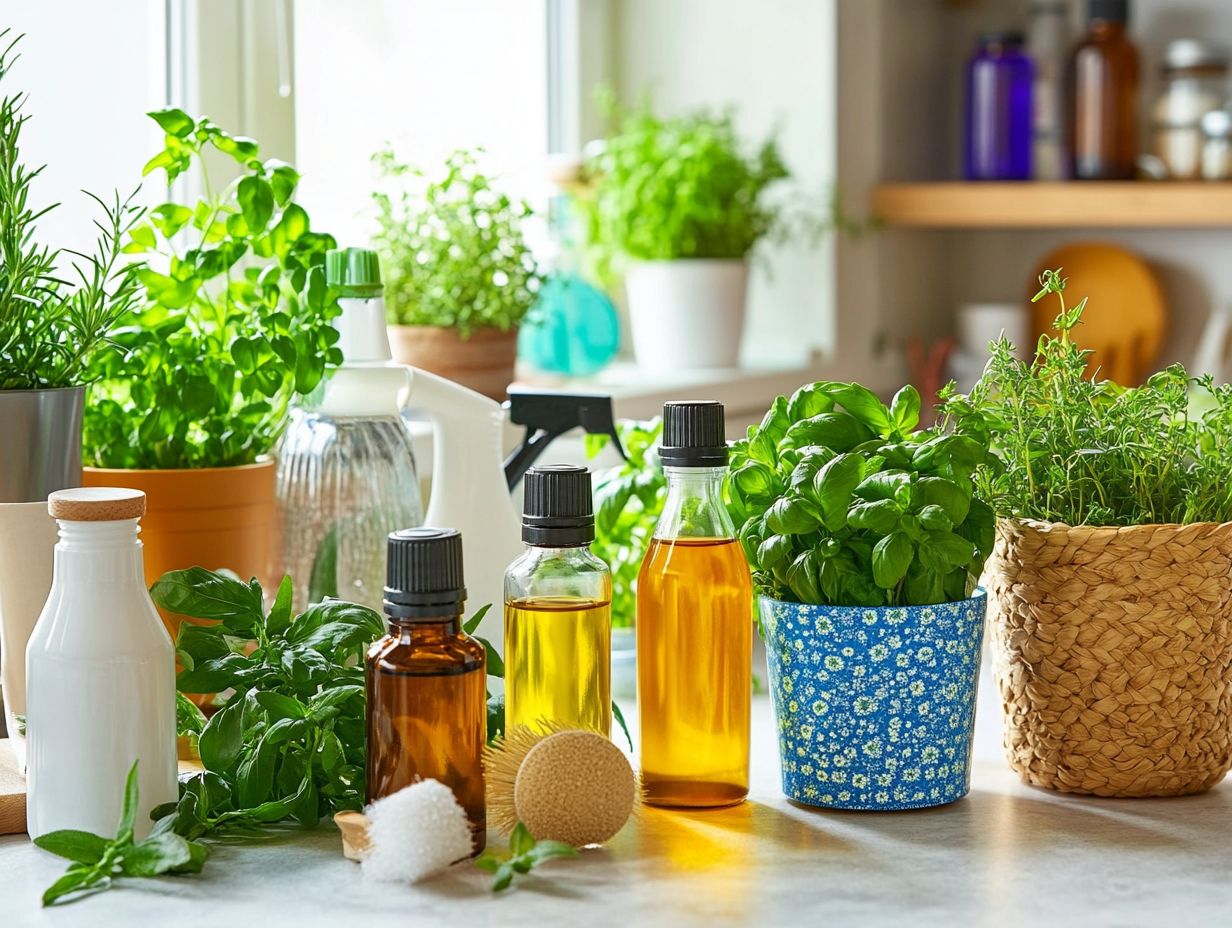
Several essential oils emerge as top contenders for cleaning, thanks to their potent properties and captivating aromas. Oils like tea tree, lemon, peppermint, lavender, and pine not only excel in their cleaning prowess but also enhance your surroundings with a fresh and inviting ambiance.
Integrating these essential oils into your cleaning regimen allows you to enjoy both their practical advantages and their remarkable ability to elevate your overall sense of well-being.
1. Lemon Essential Oil
Lemon essential oil is celebrated for its invigorating aroma and remarkable cleaning prowess, making it an ideal choice for your homemade cleaners.
Its antibacterial properties play a crucial role in fighting off germs and bacteria, ensuring that your surfaces not only exude a fresh scent but are also thoroughly sanitized. Derived from lemon peels, this natural oil boasts powerful compounds like limonene, enhancing its ability to tackle tough stains and grime.
Discover endless possibilities to boost your cleaning routine! Try mixing a few drops with water for a refreshing surface spray, adding it to your laundry for an uplifting fragrance and extra disinfecting power, or combining it with white vinegar and baking soda for an effective cleaning paste.
Lemon essential oil serves as a fantastic substitute for harsh chemicals in your kitchen and bathroom, offering a safer alternative for households, especially those with children and pets.
Embrace the vibrant energy of lemon essential oil to cultivate a clean and lively environment that truly celebrates the wonders of nature.
2. Tea Tree Essential Oil
Tea tree essential oil is highly regarded for its potent bacteria-fighting properties, making it an exceptional addition to any homemade cleaning solution.
This remarkable oil not only eradicates germs and mold. It also infuses your space with a fresh, invigorating aroma that can truly elevate the atmosphere.
Incorporating tea tree oil into your cleaning recipes can revolutionize your approach, effectively tackling mildew in bathrooms and kitchens.
Whether you choose to mix it with vinegar for a versatile all-purpose cleaner, blend it with lemon juice for additional disinfectant properties, or dilute it with water for a refreshing surface spray, its natural disinfectant qualities significantly enhance your routine cleaning tasks.
Its ability to repel pests makes it an invaluable asset for maintaining a pristine home environment, all while embracing a safe and eco-friendly cleaning method.
3. Peppermint Essential Oil
Peppermint essential oil presents a refreshing aroma along with impressive cleaning properties, making it an excellent choice for elevating your cleaning routine.
This oil isn t merely a pleasant addition; it possesses powerful antibacterial effects that can effectively eliminate germs and bacteria from surfaces.
By incorporating peppermint essential oil into your cleaning recipes, you can significantly enhance the efficacy of your homemade solutions.
For example, when you blend peppermint oil with vinegar or baking soda, you create an all-purpose cleaner that not only leaves surfaces sparkling but also fills your space with a delightful, invigorating scent.
Additionally, peppermint oil acts as a pest repellent, making it valuable for maintaining a clean and fresh kitchen sink area. Its natural deterrent properties work wonders in keeping pests at bay, adding to its value in managing your household and potential reduction of diseases.
Ultimately, incorporating peppermint essential oil can transform your everyday cleaning tasks into a refreshing and highly effective experience, leveraging various essential oil benefits.
4. Lavender Essential Oil
You’ll love how lavender essential oil fills your home with a delightful, calming aroma, making it an ideal choice for establishing a serene cleaning environment.
Its benefits extend well beyond mere cleanliness. This versatile oil is highly regarded for its ability to promote relaxation and alleviate stress, earning its place as a favorite in aromatherapy practices.
With just a few drops, you can transform your home into a peaceful sanctuary, where the soothing scent envelops you in tranquility. Lavender essential oil not only uplifts your mood but also supports restful sleep, cultivating a peaceful atmosphere that nurtures your well-being.
Whether you use it in diffusers, add it to baths, or incorporate it into a variety of home products, this oil significantly enriches your daily life while promoting holistic health.
How to Use Essential Oils for Cleaning?
Using essential oils for cleaning is not only simple but also remarkably effective, enabling you to craft your own homemade cleaners that cater precisely to your needs, while providing fresh scents to your living spaces.
Whether you re looking to whip up an all-purpose cleaner, disinfecting wipes, or a refreshing air freshener, the array of cleaning recipes that feature essential oils is truly impressive.
By combining natural ingredients such as lemon juice, baking soda, and white vinegar with essential oils like cinnamon or myrtle, you can concoct powerful cleaning solutions that are not only effective but also a joy to use.
Start using these oils today to transform your cleaning routine into something fresh and enjoyable!
Try these essential oils today for a cleaner, fresher home and experience the difference for yourself!
1. All-Purpose Cleaning Spray
An all-purpose cleaning spray is a versatile solution for various surfaces throughout your home, easily cleaning dirt and grime.
This eco-friendly cleaner harnesses the power of natural ingredients along with uplifting essential oil fragrances, making it perfect for keeping kitchens, bathrooms, and living areas pristine.
To whip up this effective solution, simply mix:
- One cup of water
- One cup of white vinegar
- 10-15 drops of your favorite essential oils perhaps lemon for a bright, citrusy aroma or tea tree oil for its natural antibacterial benefits.
Before each use, give it a good shake and watch dirt vanish effortlessly from countertops, appliances, and even glass surfaces. This cleaner leaves a great shine and adds a lovely scent that enhances your space’s ambiance.
2. Disinfecting Wipes
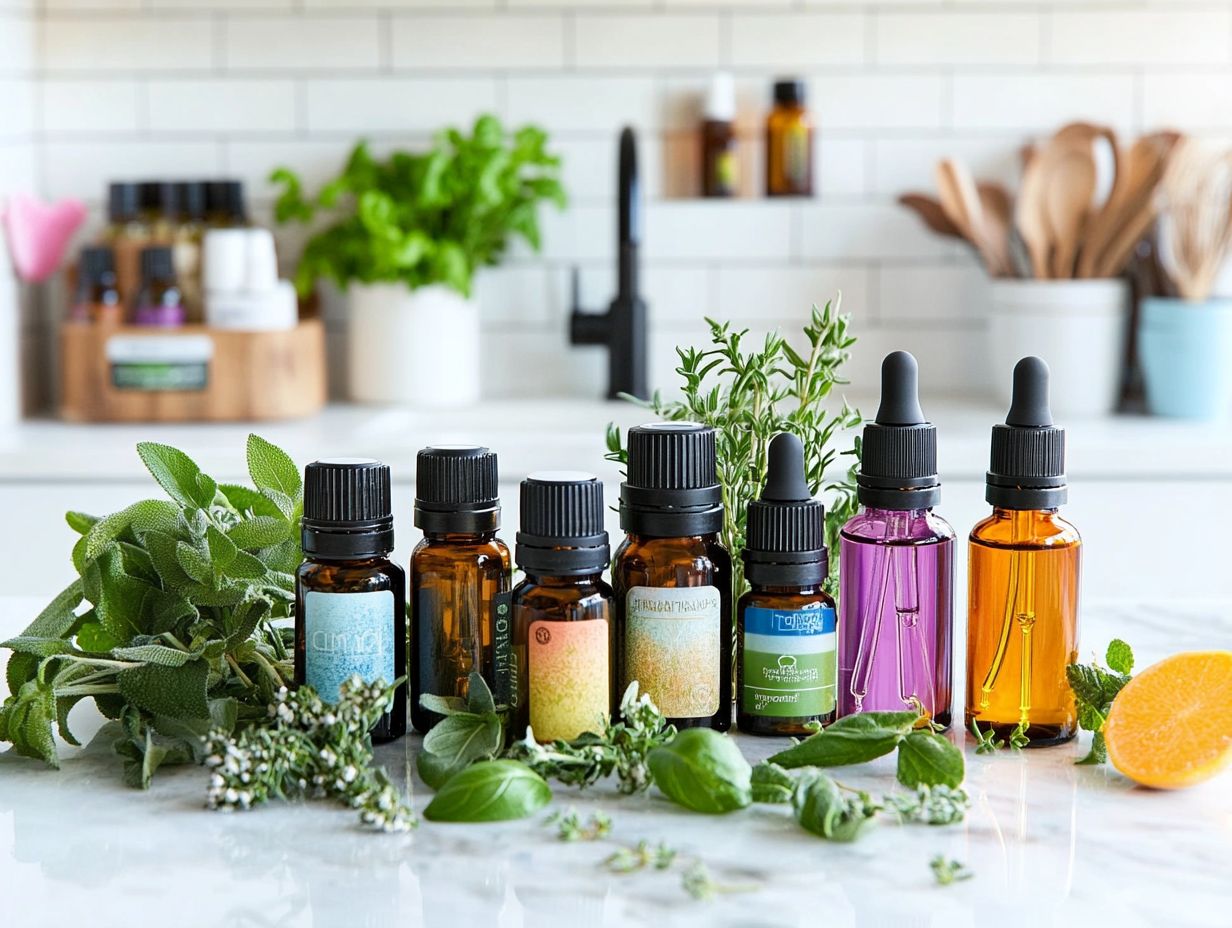
Homemade disinfecting wipes provide a convenient solution for quick cleaning, especially in high-touch areas like your kitchen sink and doorknobs. These wipes tackle germs and bacteria while leaving a refreshing scent, making your cleaning routine more enjoyable.
Incorporating essential oils into your recipe boosts their antibacterial properties and infuses your home with delightful aromas. To craft these effective wipes, gather a few basic materials:
- Paper towels
- Essential oils such as tea tree oil or lavender
- A vinegar-water solution
Follow a straightforward process to whip up a batch in minutes, ensuring you always have a reliable cleaning tool ready for frequently touched surfaces.
3. Air Freshener
Creating a natural air freshener with essential oils helps eliminate unpleasant odors while infusing your space with delightful scents. By choosing this homemade alternative, you rejuvenate the air and avoid the harsh chemicals often found in commercial sprays.
Essential oils, derived from plants, have therapeutic properties that uplift your mood and create a calming atmosphere. A simple recipe involves mixing a cup of water, a few drops of your favorite essential oil, and a teaspoon of baking soda in a spray bottle. This blend freshens your room and purifies the air, making it safer for families and pets alike.
Making the switch to this eco-friendly air freshener cultivates a more pleasant and health-conscious living environment for you and your loved ones.
Are There Any Risks or Side Effects of Using Essential Oils for Cleaning?
While essential oils are fantastic allies in your cleaning routine, it s essential to recognize their potential risks and side effects. You may encounter issues such as skin irritation, allergic reactions, or even toxicity if you don t use them correctly.
Mastering the art of using essential oils safely and effectively is crucial for reaping their many benefits while minimizing unwanted effects.
1. Skin Irritation
Skin irritation is a primary concern when using essential oils, as some individuals may experience rashes or allergic reactions upon direct contact. This reaction can arise from various factors, including the type and concentration of the essential oil, as well as your unique skin sensitivity, especially when using oils like basil or carrot seed.
For instance, oils like tea tree or citrus can be particularly irritating when applied without dilution. To minimize the risk of irritation, conduct a patch test before introducing a new essential oil into your routine. This helps catch any adverse reactions early on.
Blending essential oils with a carrier oil a neutral oil that dilutes essential oils can significantly reduce their potency, making them safer for your skin. Staying informed about the properties of specific oils and their potential allergens is vital for achieving effective and safe results.
2. Allergic Reactions
Allergic reactions to essential oils can present themselves in a variety of ways, ranging from mild irritations to more severe responses, depending on your individual sensitivities.
Recognizing these symptoms is essential for your safety and well-being. Common indicators often include skin irritations like rashes or redness, respiratory issues such as coughing or wheezing, and even stomach issues. You might also experience subtle signs like headaches or fatigue, which can hint at underlying sensitivities to specific compounds.
To reduce the risk of an allergic reaction, start with a patch test before applying oils more broadly.
Dilute essential oils with a carrier oil, which is a neutral oil used to mix with essential oils to make them safer for skin application. Consulting with healthcare professionals is another step that can help you identify safe practices when using these natural remedies. Being aware of your unique sensitivities is crucial to enjoying the benefits of essential oils without any discomfort.
3. Toxicity
Some essential oils can be quite toxic if ingested or used incorrectly, posing serious health risks, particularly for children and pets.
Understanding the properties of each oil is crucial to protect your loved ones! You might not realize that certain oils, such as tea tree or eucalyptus, can lead to risks when misused, potentially causing respiratory issues or skin irritations.
Therefore, when choosing essential oils for cleaning, it’s imperative that you research their safety and effectiveness. This awareness not only safeguards the well-being of your loved ones but also encourages a more mindful approach to cleaning with nature’s ingredients, ultimately benefiting both your health and the environment. For a comprehensive understanding, refer to this complete guide on essential oils for cleaning.
Tips for Using Essential Oils Safely for Cleaning
To safely enjoy the benefits of essential oils for cleaning, there are several key tips you should consider that can help you maximize their advantages while minimizing any potential risks.
When you incorporate any essential oil into your cleaning routine, understanding the appropriate dilution ratios is essential. Typically, these ratios range from 1-5%, depending on the strength of the oil and the surface you re targeting.
Start with a patch test to ensure your skin loves these oils as much as you do!
Proper storage of your essential oils is crucial. Keep them in dark glass containers and out of direct sunlight to ensure they maintain their longevity and potency.
By following these practical steps, you can effectively weave essential oils into your cleaning regimen, enjoying their aromatic and therapeutic benefits while prioritizing your safety.
Frequently Asked Questions
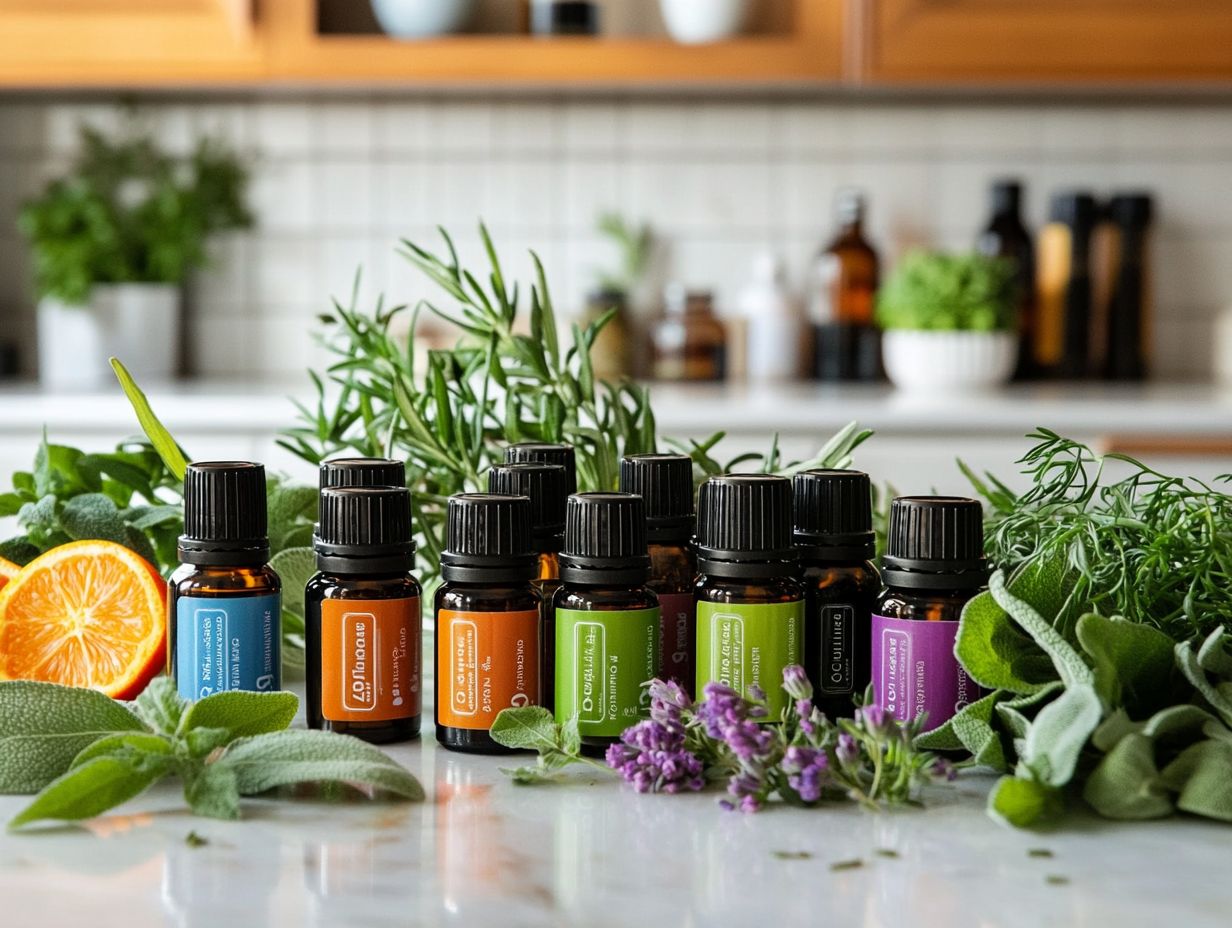
1. What are essential oils and how can they be used for cleaning?
Essential oils are concentrated plant extracts known for their aromatic and therapeutic properties. They can be used for cleaning by adding them to homemade cleaning solutions or diffusing them in the air to naturally freshen up the space.
2. Which essential oils are best for cleaning?
Some of the best essential oils for cleaning include lavender, tea tree oil, lemon, and eucalyptus, each offering unique benefits that enhance the cleaning process. These oils have natural antibacterial, antifungal, and antiviral properties that can help to effectively clean and disinfect surfaces.
3. How do I use essential oils in my cleaning routine?
There are many ways to incorporate essential oils into your cleaning routine. You can mix them with water and vinegar to create a natural all-purpose cleaner, add a few drops to your laundry detergent for a fresh scent, or use them in a diffuser to purify the air in your home.
4. Are essential oils safe to use for cleaning?
Yes, when used properly, essential oils are safe for cleaning. However, it’s important to dilute them properly and avoid using too much, as they are highly concentrated. It’s also recommended to do a patch test before using them on surfaces to ensure they won’t cause any damage.
Ready to transform your cleaning routine? Dive into the world of essential oils and discover their magic today!
5. Can essential oils replace traditional cleaning products?
Essential oils can be effective for cleaning. However, they might not fully replace traditional cleaners for difficult stains or grime.
They serve as excellent natural alternatives for everyday cleaning tasks.
6. Are there any precautions I should take when using essential oils for cleaning?
Use caution when handling essential oils. Keep them away from children and pets.
Avoid contact with your eyes, and always mix them with water or another liquid according to guidelines.
Label your homemade cleaning products clearly to ensure safety!

